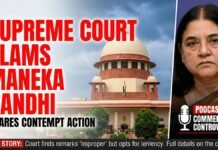
Key Points:
- In a rare disciplinary move, the Supreme Court has barred Justice Prashant Kumar of the Allahabad High Court from hearing any criminal cases until his retirement.
- The action stems from his refusal to quash a criminal complaint rooted in a civil business dispute, which the Supreme Court called “one of the worst and most erroneous orders.”
- Justice Kumar will now only sit on a division bench with a senior judge and will not independently handle criminal matters.
- The Supreme Court emphasized judicial accountability, stressing that misuse of criminal law for civil recovery is unacceptable.
- The original case was sent back for fresh hearing before another judge, reinforcing procedural fairness.
New Delhi: The Supreme Court of India has taken the extraordinary step of barring a sitting Allahabad High Court judge, Justice Prashant Kumar, from hearing any criminal cases until he retires. The move comes in response to a highly criticized order where Justice Kumar refused to quash criminal proceedings initiated purely to recover money due from a civil business transaction a move the Supreme Court deemed “a mockery of justice” and far outside settled legal principles.
What Did the Supreme Court Say?
A bench comprising Justices J.B. Pardiwala and R. Mahadevan delivered a scathing indictment, stating:
“We are constrained to observe that the impugned order is one of the worst and most erroneous orders that we have come across… The judge concerned has not only cut a sorry figure for himself but has made a mockery of justice… Passing of such absurd and erroneous orders is something unpardonable”.
The bench added that such judicial conduct raises serious concerns about the capacity and accountability of the judiciary at the High Court level.
Details of the Case
The controversy arose from a complaint by a textile company seeking recovery of outstanding money from another company. Instead of pursuing a civil suit, the company filed a criminal complaint for breach of trust (Section 406 IPC). When the accused appealed to the High Court to quash the criminal summons, Justice Prashant Kumar dismissed the plea, justifying that pursuing civil proceedings was “unrealistic” due to delays, and allowing the use of criminal law for recovery.
The Supreme Court flatly rejected this rationale, reiterating established law:
- Criminal law should not be misused for issues that are civil in nature, and doing so is an abuse of process and an affront to the legal system.
What Happens Now?
- No criminal cases: Justice Kumar will not be assigned any criminal cases as a single-judge until his retirement.
- Supervision: He must now serve only on division benches with senior judges, to “understand the nuances of law.”
- Fresh hearing: The Supreme Court has set aside the controversial order and directed that the case be reassigned for rehearing by a different judge.
Why Is This Significant?
This is the first time the Supreme Court has publicly and so explicitly restricted a sitting High Court judge from handling criminal matters, signaling a tough stance on judicial quality and accountability. The order is widely seen as a message that the higher judiciary will act decisively to preserve the integrity of legal remedies, ensuring that criminal proceedings are not used for personal vendetta or to shortcut civil law remedies.
Such interventions are rare but highlight the Supreme Court’s role as the final guardian of due process and the rule of law in India. The case also renews focus on the importance of continuous legal training, mentorship, and administrative oversight for judges at every level.
The Supreme Court’s action has sent shockwaves through the judiciary and legal community, underscoring that egregious misinterpretations of law especially those enabling the misuse of criminal justice will not be tolerated in India’s courts. This landmark rebuke aims to uphold both public faith in the judiciary and the strict separation between civil and criminal law.















































